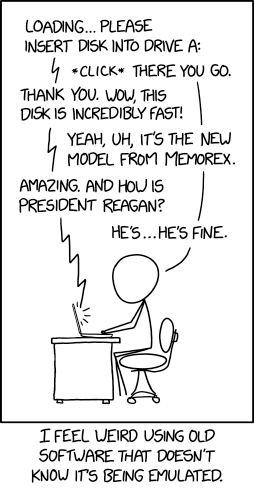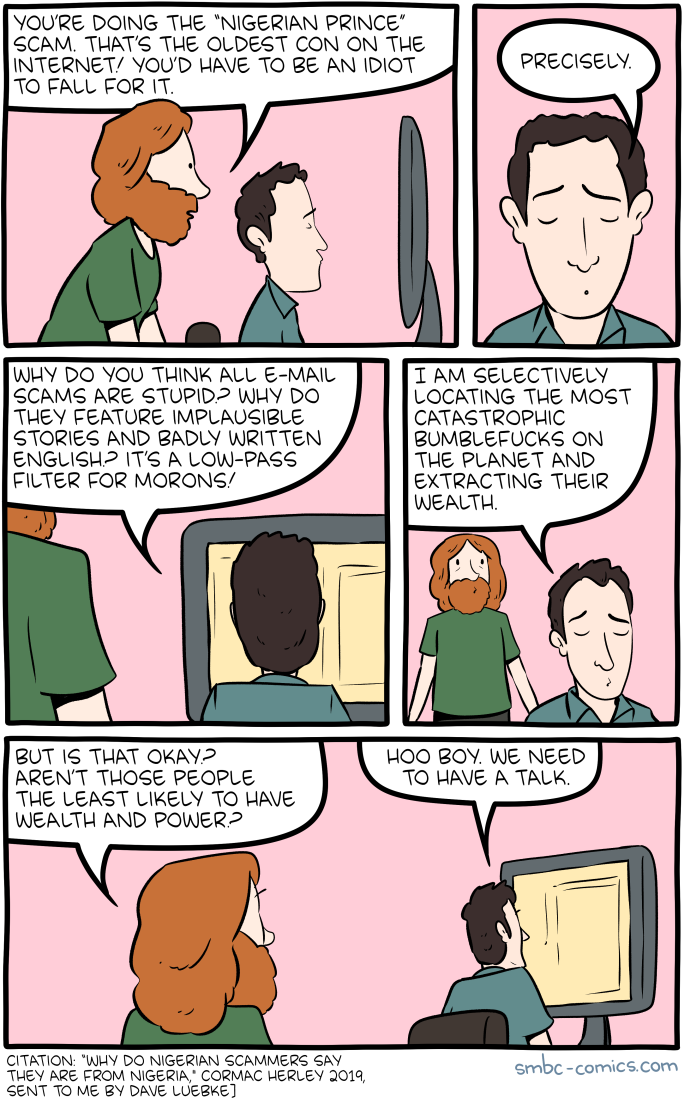reading
Sunday, 29 December 2019 - 2:38pm
This week, I have been mostly reading:
- Microfinance as Poverty-Shame Debt — Susan Engel in Progress in Political Economy (PPE):
Microfinance started as a development intervention in the 1970s and by the 1990s it was the next big thing in development. Dramatic claims about its benefits continue to be made, summed up by Irish rock star Bono’s parable: ‘Give a man a fish, he’ll eat for a day. Give a woman microcredit, she, her husband, her children, and her extended family will eat for a lifetime” (quoted in Bateman, 2014). There’s a lot of great political economy research demonstrating the problems of microfinance, including that of Milford Bateman, so what can we add? We argue that the relationship between microfinance and people’s psychosocial well-being needs far more attention and that the deliberate or otherwise use of shame here and in other development interventions needs to end.
- Warren’s cagey health plan — Doug Henwood:
Warren’s defenders say the scheme, to start with a “moderate” Dem plan and wait three years to push for the full program, is politically realistic, given Congressional and other political constraints on ambitious social programs. That argument never made sense to me. If the success of the right over the last few decades has taught us anything it’s that going for maximalist demands gets results. You might have to make some concessions along the way, but you get some wins and also push the political center of gravity in your direction. If you start out already compromised, you won’t get anywhere. So that whole phase-in approach looked to me like a signal that she wasn’t serious about the M4A part—that it was just for show. […] The only question is how conscious Warren is of this. Since she’s quite smart, it’s hard to believe she isn’t.
- New report shows the world is awash with fossil fuels. It’s time to cut off supply — Peter Christoff:
A new United Nations report shows the world’s major fossil fuel producing countries, including Australia, plan to dig up far more coal, oil and gas than can be burned if the world is to prevent serious harm from climate change. The report found fossil fuel production in 2030 is on track to be 50% more than is consistent with the 2℃ warming limit agreed under the Paris climate agreement. Production is set to be 120% more than is consistent with holding warming to 1.5℃ – the ambitious end of the Paris goals. […] The production gap is largest for coal, of which Australia is the world’s biggest exporter. By 2030, countries plan to produce 150% more coal than is consistent with a 2℃ pathway, and 280% more than is consistent with a 1.5℃ pathway.
- On the Battle of Seattle’s 20th anniversary, let’s remember the Aussie coders who created live sharing — Tom Sear in the Conversation:
Just days before the events in Seattle, two software programmers, Matthew Arnison in Sydney and Manse Jacobi in Colorado, posted a message on indymedia.org, a new website they had developed. It read: "The resistance is global… a trans-pacific collaboration has brought this web site into existence. The web dramatically alters the balance between multinational and activist media." The Seattle Independent Media Centre (Indymedia) website coordinated the protest and allowed reporters to share events to the world, live. The site received 1.5 million hits that week. Arnison had created a movement.
[I knew Matt somewhat, and had sudo access on cat.org.au. Not that I actually ever helped with anything at all, IIRC.] - Ed-Tech Agitprop — Audrey Watters:
We should want a future of human dignity and thriving and justice and security and care -- for everyone. Education is a core part of that. But dignity, thriving, justice, and care are rarely the focus of how we frame "the future of learning" or "the future of work." Robots will never care for us. Unbridled techno-solution will never offer justice. Lifelong learning isn't thriving when it is a symptom of economic precarity, of instability, of a disinvestment in the public good.
Sunday, 22 December 2019 - 1:40pm
This week, I have been mostly reading:
- Open Letter: Rethinking the Role of Banks in Economics Education — Rethinking Economics:
As research from the Bank of England, Bundesbank and numerous academics has shown, banks are not intermediaries channelling pre-existing funds from savers to borrowers. Commercial banks create the vast majority of money in circulation. Unlike other financial institutions, they create money when they extend loans to borrowers. In the process of extending a loan, banks do not move pre-existing funds from any other account but newly ‘invent’ the money by crediting the borrower’s account. Therefore, banks’ lending is constrained by borrowers’ demand, profitability considerations and financial regulations, not by pre-existing funds (i.e people’s savings) nor by central bank reserves. This reality is in line with the credit creation or endogenous money theory, which is absent from most current economics textbooks and teaching. Commercial banks also determine where money is directed in the economy. Around 80% of new money created in countries like the US and UK currently goes towards existing property and financial markets, rather than the ‘real’ or productive economy, leading to soaring house and land prices, and housing crises. In the Global South, 33 major global banks poured $1.9 trillion into fossil fuels since the 2015 Paris Climate Agreement, directly influencing the trajectory of economies that will be hit first and hardest by climate change. The power of banks to create money therefore has enormous implications for the shape and stability of our economy. Yet, in an overwhelming number of cases, economics textbooks and courses do not teach this to the economists of tomorrow.
- False Idol — Why the Christian Right Worships Donald Trump — Alex Morris in Rolling Stone:
By creating a narrative of an evil “deep state” and casting himself — a powerful white man of immense generational wealth — as a victim in his own right, Trump not only tapped into the religious right’s familiar feeling of persecution, but he also cast himself as its savior, a man of flesh who would fight the holy war on its behalf. “There’s been a real determined effort by the left to try to separate Trump from his evangelical base by shaming them into, ‘How can you support a guy like this?’ ” Jeffress tells me. “Nobody’s confused. People don’t care really about the personality of a warrior; they want him to win the fight.” And Trump’s coming to that fight with a firebrand’s feeling, turning the political stage into an ecstatic experience — a conversion moment of sorts — and the average white evangelical into an acolyte, someone who would attend rallies with the fever of revivals, listen to speeches as if they were sermons, display their faithfulness with MAGA hats, send in money as if tithing, and metaphorically bow down, again and again, at the altar of Donald Trump, who delivers the nation from its transgressions.
- I Personally Don’t Believe Solutions Are the Answer to Our Problems — in McSweeney's Internet Tendency, Chas Gillespie manages to wring the last little bit of satire out of the new normal:
On a whole range of issues — from racism to anti-Semitism to gun violence to global warming — there is a strange and quite frankly dangerous tendency among certain people to think that solutions are the answer to our problems. And sure, maybe in a place like California or Massachusetts, solutions might fly as solutions to problems. But for the rest of the country? I don’t think so.
- All of America’s 607 Billionaires Must Run for President — Jon Schwarz at the Intercept:
With Michael Bloomberg, the ninth richest man on earth, apparently running for president, Americans are asking themselves some tough questions. Like, why did we ever allow nonbillionaires to run for the highest office in the land? And why aren’t all the other billionaires jumping into the race? After all, for all intents and purposes, the United States is already run by its billionaires. They should care about us enough to make things official. If you like America, you should put a ring on it! There’s no possible downside here. We already have a guy who calls himself a billionaire as president, and that’s going great. Things could only get better with more of this billionaire magic.
- Bizarro — by Wayno and Piraro:

- The evidence from the sociologists against economic thinking is compelling
— Bill Mitchell:
When I was an economics student we were taught that unemployment, which in the real world is a major cause of poverty, was, in fact, a choice made by individuals who preferred ‘leisure’ to ‘work’ because the real wage they could access was not large enough to offset the utility they would gain from enjoying the leisure that arose from not working. There were elaborate technical analyses presented as I went through the years of study to show that if the government dared to introduce an income support payment for unemployment it would further distort the choice for leisure – the so-called ‘corner solution’ of the work-leisure model. We were also told that the real wage they faced was low because they had chosen not to invest in themselves to enhance their productivity through human capital accumulation (education and training). And the more insidious claims were that a class of impoverished people deliberately positioned themselves in this way (as a ‘utility maximising’ choice) because of categorical biases in the welfare systems.
- The Unlearning — George Monbiot:
There are two stark facts about British politics. The first is that they are controlled, to a degree unparalleled in any other Western European nation, by a tiny, unrepresentative elite. Like almost every aspect of public life here, government is dominated by people educated first at private schools, then at either Oxford or Cambridge. The second is that many of these people possess a disastrous set of traits: dishonesty, class loyalty and an absence of principle. The current Prime Minister exemplifies them. What drives him? What enables such people to dominate us? We urgently need to understand a system that has poisoned the life of this nation for over a century. I think I understand it better than most, because there is a strong similarity between what might have been the defining event of Boris Johnson’s childhood and mine. Both of us endured a peculiarly British form of abuse, that is intimately associated with the nature of power in this country. We were sent to boarding school when we were very young.
- Classics for the people — Edith Hall in Aeon:
Classical topics were included on the curricula of Mutual Improvement Societies, adult schools, Mechanics’ Institutes, university extension schemes, the Workers’ Educational Association, trade unions and the early Labour Colleges. These initiatives did much to counter the sluggish legislative response to workers’ demands for education: it was not until the Elementary Education Acts of 1870 and 1880 that even rudimentary instruction in literacy and numeracy, let alone access to classical culture, became universally and freely available to children under 13. But there had long been other ways to learn about the Greeks and Romans. Museums in Britain were visited by a far wider class cross-section than their Continental equivalents, where the admission of visitors to the princely galleries was closely monitored. There was a sense that art and archaeology somehow belonged to the nation rather than exclusively to wealthy individuals; free admission was customary. A Prussian traveller in London was disturbed to find in 1782 that the visitors to the British Museum were ‘various … some I believe, of the very lowest classes of the people, of both sexes, for as it is the property of the nation, everyone has the same right … to see it, that another has’. And classical sculptures such as the Parthenon frieze and the Venus de Milo were endlessly reproduced in forms accessible even to the poorest Briton: plaster reproductions in municipal museums across the nation, cheap self-education magazines such as Cassell’s Popular Educator, and volumes published by the Society for the Diffusion of Useful Knowledge, available in libraries of Mechanics’ Institutes. Lower-class visitors’ memoirs often imply that what they saw in museums nurtured an impulse towards self-education.
- Bolivian Coup Comes Less Than a Week After Morales Stopped Multinational Firm's Lithium Deal — Eoin Higgins at Common Dreams:
The Sunday military coup in Bolivia has put in place a government which appears likely to reverse a decision by just-resigned President Evo Morales to cancel an agreement with a German company for developing lithium deposits in the Latin American country for batteries like those in electric cars. […] The Morales move on Nov. 4 to cancel the December 2018 agreement with Germany's ACI Systems Alemania (ACISA) came after weeks of protests from residents of the Potosí area. The region has 50% to 70% of the world's lithium reserves in the Salar de Uyuni salt flats. Among other clients, ACISA provides batteries to Tesla; Tesla's stock rose Monday after the weekend. […] ACISA told German broadcaster DW last week that the company was "confident that our lithium project will be resumed after a phase of political calmness and clarification."
- Machine Learning Captcha — xkcd by Randal Monroe:

Sunday, 15 December 2019 - 2:12pm
This week, I have been mostly reading:
- Emulation — xkcd by Randal Monroe:

- Harvesting the Blood of America’s Poor: The Latest Stage of Capitalism — Alan Macleod in MintPress News:
For much of the world, donating blood is purely an act of solidarity; a civic duty that the healthy perform to aid others in need. The idea of being paid for such an action would be considered bizarre. But in the United States, it is big business. Indeed, in today’s wretched economy, where around 130 million Americans admit an inability to pay for basic needs like food, housing or healthcare, buying and selling blood is of the few booming industries America has left. The number of collection centers in the United States has more than doubled since 2005 and blood now makes up well over 2 percent of total U.S. exports by value. To put that in perspective, Americans’ blood is now worth more than all exported corn or soy products that cover vast areas of the country’s heartland. The U.S. supplies fully 70 percent of the world’s plasma, mainly because most other countries have banned the practice on ethical and medical grounds. Exports increased by over 13 percent, to $28.6 billion, between 2016 and 2017, and the plasma market is projected to “grow radiantly,” according to one industry report. The majority goes to wealthy European countries; Germany, for example, buys 15 percent of all U.S. blood exports. China and Japan are also key customers.
- Placing and Spacing the Dead in Colonial Accra — Sarah Balakrishnan in the Metropole:
Cemeteries were undoubtedly a part of British colonists’ bid to reorganize African societies according to Christian schematics of “civilization”—what has been called the “civilizing mission.” But they also had another, more insidious, ambition. Creating private property in Accra required cemeteries. Graveyards relocated ancestors to the public domain, making it possible for Gold Coasters to sell their property to interested buyers. British colonists had long understood that communities in Accra would never sell their land if it contained the remains of their elders. Public cemeteries thus transferred rituals of social reproduction—celebrating, mourning, and remembering the dead—into the domain of the state, so that private houses could be made fungible and sellable. Like elsewhere in the world, commemorations of death shaped the devolution of property. In colonial Accra, British colonists used cemeteries to enforce private property in land.
- Hoax — Saturday Morning Breakfast Cereal by Zach Weinersmith:

- Leopards do not change their spots — Bill Mitchell:
Keating became Treasurer in 1983 and inherited the emerging neoliberalism about deregulation, privatisation and the obsession with the pursuit of fiscal surpluses. He inherited a weak economy but set about pursuing surpluses as soon as he could and by 1987-88 fiscal year recorded the first of three consecutive surpluses – 0.4 per cent of GDP, 1.5 per cent of GDP and again, 1.5 per cent in 1989-90. The data shows that he only recorded three surpluses during his period as Treasurer. Further, his praise for the Costello surpluses (he became Treasurer when the Conservatives took power in 1996) and was only able to achieve those surpluses because the financial market deregulation mania that both Keating and Costello implemented reduced regulations on banks and oversight by the authorities and led to the credit binge that saw the household saving ratio move into negative figures and household debt rise from about 60 per cent of disposable income to 180 odd per cent. Without that unsustainable credit binge, the economy would have tanked under the strain of Costello’s fiscal drag (the surpluses) and he would have been back in deficit quick smart. Just as Keating experienced after his obsessive pursuit of surpluses. In 1990-91, Australia had its worst recession since the 1930s.
- Household Debt: A Tale of Three Countries — Steven Hail for Renegade Inc:
The beneficial role of the deficit, and the irrelevance of its impact on the stock of Japanese government debt, is not generally understood, even in Japan. Debt and deficit in Japan are not a sign of economic failure – they are the hallmark of a largely successful attempt to maintain living standards and close to full employment labour market, in an economy where private saving (and especially corporate saving) has outstripped private investment spending. It is very important to understand this. Many economists, commentators and credit ratings agencies still don’t understand this. They have been vaguely forecasting doom, or at least some kind of financial crisis, for Japan for a couple of decades now. It wasn’t in Japan that the Global Financial Crisis developed. It wasn’t in Japan that the problems of the euro emerged. It isn’t Japan that is faced with dangerous household debt now. These various commentators still don’t understand the fiscal space enjoyed by monetary sovereigns like the Japanese government. They don’t understand the appropriate role for the government’s budget in such countries. They look for crises where none will occur. They miss the financial fragilities which drive those crises that do happen. They are very slow to learn. The only thing to do is to ignore them and their advice.
- Manufacturing Fear and Loathing, Maximizing Corporate Profits! A Review of Matt Taibbi’s Hate Inc.: Why Today’s Media Makes Us Despise One Another — by John Siman in Naked Capitalism:
Because of the tweaking of the Herman/Chomsky propaganda model necessitated by the disappearance of the USSR in 1991 (“The Russians escaped while we weren’t watching them, / As Russians do…,” Jackson Browne presciently prophesied on MTV way back in 1983), one might now want to speak of a Propaganda Model 2.0. For, as Taibbi notes, “…the biggest change to Chomsky’s model is the discovery of a far superior ‘common enemy’ in modern media: each other. So long as we remain a bitterly-divided two-party state, we’ll never want for TV villains”.
- Impeachment Talk — This Modern World by Tom Tomorrow:

Sunday, 8 December 2019 - 7:59pm
This week, I have been mostly reading:
- Chemistry Nobel — xkcd by Randall Monroe:

- After Avoiding Safety Upgrades, PG&E Hired Lobbyists and Public Relations Instead — Lee Fang at the Intercept:
Power shutoffs affecting more than 1 million residents, scheduled by PG&E this week throughout the San Francisco Bay Area and Northern California, have sparked a massive backlash, with many community members telling reporters that they are shocked that the company has not done more to upgrade its transmission lines. The decision to shut off the electricity services, a precaution over concerns about high winds, raises the question of precisely how PG&E has been spending its rate-payers’ money. And the answer isn’t pretty: While neglecting safety upgrades and investments in its aging infrastructure, PG&E has instead been lavishly rewarding shareholders and buying political influence. Over the last year, reporters have highlighted the large lobby spending and billions of dollars in dividend payments to investors by PG&E, while the company avoided necessary investments in its aging transmission towers — some of which are among the oldest in the world and were known to the company to be a potential fire hazard. The aging transmission lines caused the Camp Fire wildfires last November, the most destructive in California history, that left 86 dead, over a dozen injured, and caused at least $16 billion in damages.
- Saturday Morning Breakfast Cereal by Zach Weinersmith:

- Australia’s “Fair Go” Is a Lie — Jeremy Poxon from the Australian Unemployed Workers’ Union in Jacobin:
According to a recent survey conducted by the Australian Council of Social Service, 84 percent of Newstart recipients skip meals in order to survive on the entitlement. Colloquially, low-income Australians refer to this as “the Newstart diet.” Unsurprisingly, this level of deprivation is psychologically debilitating. Being unemployed in Australia means experiencing depression, stress, anxiety, and loneliness on a daily basis. In a recent survey, the Australian Unemployed Workers’ Union (AUWU) found that 98 percent of its members experienced significant social isolation. Increasingly, Australia’s unemployed cannot afford to put fuel in their cars, pay for public transport, or meaningfully engage with their friends and communities.
- Where’s Your Football, Lucy? — Ted Rall:

- Assange in Court — Craig Murray:
Until yesterday I had always been quietly sceptical of those who claimed that Julian’s treatment amounted to torture – even of Nils Melzer, the UN Special Rapporteur on Torture – and sceptical of those who suggested he may be subject to debilitating drug treatments. But having attended the trials in Uzbekistan of several victims of extreme torture, and having worked with survivors from Sierra Leone and elsewhere, I can tell you that yesterday changed my mind entirely and Julian exhibited exactly the symptoms of a torture victim brought blinking into the light, particularly in terms of disorientation, confusion, and the real struggle to assert free will through the fog of learned helplessness. I had been even more sceptical of those who claimed, as a senior member of his legal team did to me on Sunday night, that they were worried that Julian might not live to the end of the extradition process. I now find myself not only believing it, but haunted by the thought. Everybody in that court yesterday saw that one of the greatest journalists and most important dissidents of our times is being tortured to death by the state, before our eyes. To see my friend, the most articulate man, the fastest thinker, I have ever known, reduced to that shambling and incoherent wreck, was unbearable. Yet the agents of the state, particularly the callous magistrate Vanessa Baraitser, were not just prepared but eager to be a part of this bloodsport.
Sunday, 1 December 2019 - 4:05pm
This fortnight, I have been mostly reading:
- Against Economics — David Graeber reviews Robert Skidelsky's latest book:
To this day, economics continues to be taught not as a story of arguments—not, like any other social science, as a welter of often warring theoretical perspectives—but rather as something more like physics, the gradual realization of universal, unimpeachable mathematical truths. […] As a result, heterodox economists continue to be treated as just a step or two away from crackpots, despite the fact that they often have a much better record of predicting real-world economic events. What’s more, the basic psychological assumptions on which mainstream (neoclassical) economics is based—though they have long since been disproved by actual psychologists—have colonized the rest of the academy, and have had a profound impact on popular understandings of the world.
- Doonesbury — by Gary Trudeau:
- I wasn’t just a brain in a jar — Christian Lorentzen reviews Permanent Record by Edward Snowden in the London Review of Books:
Snowden still faces three felony charges, two of them under the Espionage Act, under which the government can withhold public presentation of the evidence against the defendant by claiming the interests of national security. Obama declined to pardon him. In the wake of Russiagate, it’s common to hear people, even left-leaning journalists, speculate that Snowden has been a Russian agent all along, especially now that the US intelligence services have rebranded themselves as the strongest institutional branch of the #Resistance to the current president. Meanwhile the government’s machines of repression, those carefully cooled datacentres, hum along in Maryland, Utah and Hawaii.
- How America’s Elites Lost Their Grip — Time Magazine, ironically late to the zeitgeist as always, runs a compensatory cover story by Anand Giridharadas:
If a single cultural idea has upheld the disproportionate power of this class, it has been the idea of the “win-win.” They could get rich and then “give back” to you: win-win. They could run a fund that made them sizable returns and offered you social returns too: win-win. They could sell sugary drinks to children in schools and work on public-private partnerships to improve children’s health: win-win. They could build cutthroat technology monopolies and get credit for serving to connect humanity and foster community: win-win. As this seductive idea fizzles out, it raises the possibility that this age of capital, in which money was the ultimate organizing principle of American life, could actually end. Something could actually replace it. After all, a century ago, America was firmly planted in the first Gilded Age—and then it found its way into the Progressive Era and the New Deal, an era of great public ambition. Business didn’t go away; it wasn’t abolished; capitalists didn’t go into gulags. It was just that the emphasis of the society shifted. Money was no longer the lodestar of all pursuits. The choice facing Americans is whether we want to be a society organized around money’s thirsts, a playground for the whims of billionaires, or whether we wish to be a democracy.
- The Web began dying in 2014, here's how — André Staltz:
The internet will survive longer than the Web will. GOOG-FB-AMZN will still depend on submarine internet cables (the “Backbone”), because it is a technical success. That said, many aspects of the internet will lose their relevance, and the underlying infrastructure could be optimized only for GOOG traffic, FB traffic, and AMZN traffic. It wouldn’t conceptually be anymore a “network of networks”, but just a “network of three networks”, the Trinet, if you will. The concept of workplace network which gave birth to the internet infrastructure would migrate to a more abstract level: Facebook Groups, Google Hangouts, G Suite, and other competing services which can be acquired by a tech giant. Workplace networks are already today emulated in software as a service, not as traditional Local Area Networks. To improve user experience, the Trinet would be a technical evolution of the internet. These efforts are already happening today, at GOOG. In the long-term, supporting routing for the old internet and the old Web would be an overhead, so it could be beneficial to cut support for the diverse internet on the protocol and hardware level. Access to the old internet could be emulated on GOOG’s cloud accessed through the Trinet, much like how Windows 95 can be today emulated in your browser. ISPs would recognize the obsolescence of the internet and support the Trinet only, driven by market demand for optimal user experience from GOOG-FB-AMZN.
- Prince Floppyknife — Phil Are Go!:

- Trump Attacked the Women of Color Who Led the Push for Impeachment. Then CNN Erased Them. — Natasha Lennard, the Interccept:
According to a weekend CNN feature, credit for the impeachment effort should instead go to four freshmen members of Congress — all of them white women with backgrounds in national security work. These women, who rather unbearably call themselves “the badasses,” only came around to supporting impeachment in the last two weeks. On the air, CNN host Jake Tapper, following up on a Trump campaign adviser’s remarks, questioned whether two early advocates for impeachment — Tlaib and Rep. Al Green, D-Texas, who is black — undermined the seriousness of the pursuit. “Do those members of your party,” Tapper asked Rep. Elissa Slotkin, D-Mich. — one of the “badasses” — on his Sunday show, “undermine the seriousness with which you and other colleagues of yours want to proceed?” (Slotkin simply said she couldn’t speak for others and returned to her talking points.) Taken together, the picture speaks to an even more grim dynamic: While Trump demonizes Congress’s progressive women of color, CNN erases their work.
Sunday, 17 November 2019 - 9:46am
This fortnight, I have been mostly reading:
- Break up the Dem Party — Michael Hudson:
The problem facing the Democratic National Committee today remains the same as in 2016: How to block even a moderately left-wing social democrat by picking a candidate guaranteed to lose to Trump, so as to continue the policies that serve banks, the financial markets and military spending for Cold War 2.0. DNC donors favor Joe Biden, long-time senator from the credit-card and corporate-shell state of Delaware, and opportunistic California prosecutor Kamala Harris, with a hopey-changey grab bag alternative in smooth-talking small-town Rorschach blot candidate Pete Buttigieg. These easy victims are presented as “electable” in full knowledge that they will fail against Trump. Trump meanwhile has done most everything the Democratic Donor Class wants: He has cut taxes on the wealthy, cut social spending for the population at large, backed Quantitative Easing to inflate the stock and bond markets, and pursued Cold War 2.0. Best of all, his abrasive style has enabled Democrats to blame the Republicans for the giveaway to the rich, as if they would have followed a different policy.
- Bizarro — by Wayno and Piraro:

- Superblocks: Barcelona’s car-free zones could extend lives and boost mental health — Anupam Nanda from the University of Reading in the Conversation:
Congestion, pollution and a lack of community spaces have become major drags on people’s aspirations and experiences of urban living. In response, cities must manage their resources and priorities to create sustainable places for visitors and residents, and foster innovation and growth. Enter Barcelona – the capital of Catalonia, in Spain – where a bold stroke of urban planning first introduced “superblocks” in 2016.

- Turns Out, Alexandria Ocasio-Cortez Is Huge in Iowa — Tim Murphy for Mother Jones:
Sanders’ core identity is that he’s a man who doesn’t change—Ocasio-Cortez told the crowd Saturday night that she endorsed him because he had been fighting for people like her before she was born. The consistency is the thing; you hear it again and again. So much so that there is a frustration among supporters that other candidates have profited at his expense by simply appropriating aspects of his agenda. “Every candidate is saying what Bernie has been saying,” said Robin Ruetenik of Coralville. “It’s a coattail orgy.” But if this campaign turns out different from the last, it’ll be because of the subtle ways he and his movement have evolved. In 2016, Sanders was traveling around the country, promising a new day in America that you could only faintly begin to discern. In 2020, the revolution he promised isn’t quite so hard to imagine—she takes the stage right before him. That’s its own form of renewable energy.
- This Simple Structure Unites All Human Languages — David Adger in Nautilus:
Human language is amazingly creative. If you make up a sentence of any complexity, and search for that exact sentence on the Internet, it’s almost never there. Virtually everything we say is novel. Yet at the heart of this capacity of ours lies an incredibly simple piece of mental technology: Merge. Merge takes two bits of language, say two words, and creates out of them another bit of language. It builds the hierarchical structures of language. Merge was proposed by Noam Chomsky in the early 1990s. He argued that this single piece of mental technology, plus language specific constraints that children could learn from their linguistic experiences, was enough to capture the syntax of all human languages.
- Stephen Miller’s Affinity for White Nationalism Revealed in Leaked Emails — Michael Edison Hayden for the Southern Poverty Law Center's Hatewatch blog:
Hatewatch reviewed more than 900 previously private emails Miller sent to Breitbart editors from March 4, 2015, to June 27, 2016. Miller does not converse along a wide range of topics in the emails. His focus is strikingly narrow – more than 80 percent of the emails Hatewatch reviewed relate to or appear on threads relating to the subjects of race or immigration. Hatewatch made multiple attempts to reach the White House for a comment from Miller about the content of his emails but did not receive any reply. Miller’s perspective on race and immigration across the emails is repetitious. When discussing crime, which he does scores of times, Miller focuses on offenses committed by nonwhites. On immigration, he touches solely on the perspective of severely limiting or ending nonwhite immigration to the United States. Hatewatch was unable to find any examples of Miller writing sympathetically or even in neutral tones about any person who is nonwhite or foreign-born.
Sunday, 3 November 2019 - 10:41am
This fortnight, I don't know what I've been doing, besides not reading enough:
- Opinion: How Artists And Fans Stopped Facial Recognition From Invading Music Festivals — Evan Greer and Tom Morello in BuzzFeed:
Industry giants like Ticketmaster invested money in companies like Blink Identity, a startup run by ex–defense contractors who helped build the US military’s facial recognition system in Afghanistan. These vendors, and the venture capitalists who backed them, saw the live music industry as a huge potential market for biometric surveillance tech, marketed as a convenient ticketing option to concertgoers. […] Over the last month, artists and fans waged a grassroots war to stop Orwellian surveillance technology from invading live music events. Today we declare victory. Our campaign pushed more than 40 of the world’s largest music festivals — like Coachella, Bonnaroo, and SXSW — to go on the record and state clearly that they have no plans to use facial recognition technology at their events. Facing backlash, Ticketmaster all but threw Blink Identity under the bus, distancing itself from the surveillance startup it boasted about partnering with just a year ago. This victory is the first major blow to the spread of commercial facial recognition in the United States, and its significance cannot be overstated. In a few short weeks, using basic grassroots activism tactics like online petitions, social media pressure, and an economic boycott targeting festival sponsors, artists and fans killed the idea of facial recognition at US music festivals. Now we need to do the same for sporting events, transportation, public housing, schools, law enforcement agencies, and all public places. And there’s no time to lose.
- These ‘job snob’ claims don’t match the evidence — Greg Marston et al. in the Conversation:
Between 2015 and 2018, we were part of a team studying the well-being, social networks and job search experiences of unemployed Australians. Our study, funded by the Australian Research Council, involved policy analysis, surveys and in-depth interviews. We talked to the employment service providers and 80 job seekers in regional and urban areas of New South Wales and Queensland. We found no evidence that job-seekers preferred not to work. In fact, based on the considerable “job search activity” required of them to meet Centrelink’s stringent “mutual obligation” conditions, we had to conclude that, whatever the reasons for their joblessness, unwillingness to work was not one of them.
- Bernie Sanders Is the Best on the Minimum Wage and It’s Not Near — Ted Rall:

- Why do so many Americans hate the welfare state? — Elizabeth Anderson interviewed by Joe Humphreys for the Irish Times:
One way to think about it is this is another bizarre legacy of Calvinist thought. It’s really deep in Protestantism that each individual is responsible for their own salvation. It’s really an anti-Catholic thing, right? The Catholics have this giant institution that’s going to help people; and Protestantism says, no, no, no, it’s totally you and your conscience, or your faith. That individualism – the idea that I’ve got to save myself – got secularised over time. And it is deep, much deeper in America than in Europe – not only because there are way more Catholics in Europe who never bought into this ideology – but also in Europe due to the experience of the two World Wars they realised they are all in the boat together and they better work together or else all is lost. America was never under existential threat. So you didn’t have that same sense of the absolute necessity for individual survival that we come together as a nation. I think those experiences are really profound and helped to propel the welfare state across Europe post World War II.
Sunday, 20 October 2019 - 1:36pm
This week, I have been mostly reading:
- Food in the Bowl — The Oatmeal by Matthew Inman:

- Microeconomic success, macroeconomic failure — Dr Cameron K. Murray:
When I teach macroeconomics, I use a dog and bone analogy to demonstrate that the macro-economy is not equivalent to just “adding up” the micro. Let’s see the analogy in action. In the dog and bone economy, ten dogs repeatedly try to find nine bones buried in the yard. Each round, at least one dog misses out. We think that this outcome is undesirable— we can’t have an economy with over 10% dog “bone poverty” and perpetual “dog unemployment”! Some astute dog economists notice that dogs that miss out on a bone are usually a little slower, or have some other traits that make them relatively poor performers. They reason that there is a “skills mismatch” that, if corrected, could solve the macro-economic problems in the dog economy.
- Devin Nunes and the Power of Keyword Signaling — Francesca Tripodi in Wired:
When there is limited or no content available on a topic, it’s possible to game search engines to guarantee that certain keywords will be directed to content that includes these terms or is tagged accordingly. This is why conspiracy theorists were able to capitalize on the concept of a “crisis actor.” By producing a plethora of insidious content rife with the term and maximizing SEO, conspiracy theorists filled what Microsoft’s Michael Golebiewski and danah boyd referred to as a “data void.” Searches for “crisis actor” got conspiratorial results until other sources filled the void with more legitimate content debunking the theory.
- Alcohol really is no excuse for bad behaviour – research reveals you’re still the same person after a drink — Kathryn Francis, who writes about it in the Conversation, gave some people the trolley problem and some vodka. Because science!:
While alcohol might have impaired the empathy of our participants, it didn’t have an effect on how they judged these moral situations or how they acted in them. If someone chose to push the person off the footbridge in order to save more lives while sober, they did the same thing when drunk. If people refused to sacrifice the person’s life in the same situation because they believed that killing was wrong regardless of the consequences, they also did the same when drunk. It turns out that while we might believe that alcohol changes our personalities, it doesn’t. You’re still the same person after a drink – your existing sense of morality left intact. So while alcohol might affect how we interpret and understand the emotions of other people, we can’t blame our immoral behaviours on alcohol.
- Bloom County 2019 — by Berkeley Breathed:
Sunday, 13 October 2019 - 4:36pm
This week, I have been mostly reading:
- Neoliberalism: Political Success, Economic Failure — Robert Kuttner in the American Prospect:
As the great political historian Karl Polanyi warned, when markets overwhelm society, ordinary people often turn to tyrants. In regimes that border on neofascist, klepto-capitalists get along just fine with dictators, undermining the neoliberal premise of capitalism and democracy as complements. Several authoritarian thugs, playing on tribal nationalism as the antidote to capitalist cosmopolitanism, are surprisingly popular. It's also important to appreciate that neoliberalism is not laissez-faire. Classically, the premise of a “free market” is that government simply gets out of the way. This is nonsensical, since all markets are creatures of rules, most fundamentally rules defining property, but also rules defining credit, debt, and bankruptcy; rules defining patents, trademarks, and copyrights; rules defining terms of labor; and so on. Even deregulation requires rules. In Polanyi's words, “laissez-faire was planned.” The political question is who gets to make the rules, and for whose benefit.
- The Green New Deal must wipe out precarious work and underemployment — Bill Mitchell:
I keep reading so-called Green New Deal proposals that put the Job Guarantee at the centre of the employment considerations of the concept. I think that is unfortunate. We must understand that the Job Guarantee is a very specific approach to maintaining loose full employment and price stability. At its heart it is a buffer stock mechanism rather than a job creation structure. Sure enough, it creates jobs on demand by workers who want to work but cannot find work elsewhere. In normal times, it might not create or sustain many jobs at all. And, importantly, it might not be part of a fiscal ‘stimulus’ program. […] As carbon-intensive sectors are closed down by regulation, the affected communities will transit into new activities and new employment opportunities. Underpinning it all will be the Job Guarantee safety net for those workers with a need for a minimum wage job. But the scale of the investment and skill development required will see massive shifts in workers between industries, occupations and sectors (public and private). The Job Guarantee will only be a small part of those shifts and should not be seen as the employment solution to the disruption that the Green New Deal will generate.
- #1067; The Post-Game Interview — Wondermark by David Malki !:

- The Tragedy of the Tragedy of the Commons — Matto Mildenberger in Scientific American:
Thirty years ago, a different future was available. Gradual climate policies could have slowly steered our economy towards gently declining carbon pollution levels. The costs to most Americans would have been imperceptible. But that future was stolen from us. It was stolen by powerful, carbon-polluting interests who blocked policy reforms at every turn to preserve their short-term profits. They locked each of us into an economy where fossil fuel consumption continues to be a necessity, not a choice. This is what makes attacks on individual behavior so counterproductive. Yes, it’s great to drive an electric vehicle (if you can afford it) and purchase solar panels (if powerful utilities in your state haven’t conspired to make renewable energy more expensive). But the point is that interest groups have structured the choices available to us today. Individuals don’t have the agency to steer our economic ship from the passenger deck. As Harvard historian Naomi Oreskes reminds us, “[abolitionists] wore clothes made of cotton picked by slaves. But that did not make them hypocrites … it just meant that they were also part of the slave economy, and they knew it. That is why they acted to change the system, not just their clothes.”
- Calvin and Hobbes — by Bill Waterson:
- Why I Hate Houses — Yves Smith, Naked Capitalism:
There are bona fide reasons to have problems with this way of living, namely the environmental cost. Free-standing buildings take more energy to heat and cool than multi-unit structures. Car ownership is pretty much unavoidable, since even in those few suburbs with decent public transport, it’s designed for going in and of the city center (as in for commuting), not for provisioning, transporting kids, or running other errands. And if you decide to fit in, as a recent post pointed out, “Lawns, in general, are pretty much the enemy for healthy insect habitats.” And don’t get me started on leaf blowers. Now I could pretend to not like houses out of reasons of conscience, or a preference for living in high-density areas (which I do have). But my big reason for not liking houses is the inefficiency and time sink of maintaining them.
- The Tragic Story of Jimmy Aldaoud, Deported From the Streets of Detroit to His Death in Iraq — Chris Gelardi, the Intercept:
Before he was deported, Jimmy Aldaoud had never stepped foot in Iraq. Born in Greece to Iraqi refugee parents, he immigrated to the United States with his family via a refugee resettlement program 40 years ago, when he was just 15 months old. He considered himself American and knew hardly anything of Iraqi society. Still, on the afternoon of June 4, he found himself wandering the arrivals terminal of Al Najaf International Airport, about 100 miles south of Baghdad, with around $50, some insulin for his diabetes, and the clothes on his back. […] Aldaoud spoke no Arabic, had no known family in Iraq, and nobody knew he was there. Disembarking in Najaf, he was “scared,” “confused,” and acting panicked, according to an Iraqi immigration officer he encountered. And 63 days later — this past Tuesday — he was dead.
- The ideology of postmodernism is to present all existing injustice as an effect of discrimination; Robert Pfaller tells ILNA — Iranian Labour News Agency:
The general ideological task of postmodernism is to present all existing injustice as an effect of discrimination. This is, of course, funny again: Since every discrimination presupposes an already established class structure of inequality. If you do not have unequal places, you cannot distribute individuals in a discriminating way, even if you want to do so. Thus progressive neoliberalism massively increases social inequality, while distributing all minority groups in an "equal" way over the unequal places.
- We are approaching a period of fiscal [policy] dominance — Bill Mitchell:
The dissonance in mainstream economics and the political debate about policy settings is getting deeper and more public. We now have examples of central bankers ‘throwing their hands up in the air’ and nearly begging governments to abandon their obsession with fiscal surpluses, and, instead, use fiscal policy to stimulate waning economic growth. What I think is happening is that we are entering a period of fiscal dominance, which will represent a categorical rejection of the mainstream macroeconomics consensus that has dominated policy making since the 1980s – the neoliberal era. In turn, this shift will ratify the main precepts of Modern Monetary Theory (MMT). We are observing paradigm shift occurring as the dominant neoliberal paradigm fails at every turn. There is a long way to go though before the practitioners acknowledge that such a shift has occurred. But there is progress.
- How Richard Vague Discovered Gravity: An Interview + Book Review of A Brief History of Doom: Two Hundred Years of Financial Crises — John Siman in Naked Capitalism:
Richard Vague: […] A couple of years ago, I was lamenting the fact that the U.S. did not have an industrial policy of the sort China now has and the U.S. itself has had in the past in efforts like the construction of railroads and canals. I was lamenting the lack of significantly stepped up government support for areas like 5G, high tech manufacturing, genetic engineering, and artificial intelligence, and expressed fear that China would surpass us in those areas as Japan had in automobiles in the 1980s. A friend quickly corrected me, saying that the U.S. most definitely had an industrial policy, even though it was largely unstated: namely, support for the financial and real estate sectors. That support is manifested in tax laws, regulation, and a host of other ways. A light bulb went off, since his statement was in lockstep with what I had been finding in my research. Bit by bit, by hook and by crook, there has been a disproportionate accumulation of policy support for these two industries—the very two industries I had come to view as the “swing sectors” in the economy, the most frequent source of booms and busts. And they are wed together—it is increased leverage that directly results in increased asset values. And orthodox economics, both by commission and omission, has facilitated this.
Sunday, 29 September 2019 - 1:52pm
This week, I have been mostly reading:
- Non Sequitur — by Wiley Miller:
- Why do people believe the Earth is flat? — Cory Doctorow:
In a pluralistic world, we can aspire to the rule of law, in which rigorous systems keep human frailty in check. In an oligarchic world, we’re left finding people who “sound like they know what they’re talking about” and putting our trust in them. If your people tell you that opioids are killing you (and possibly save your life in the process) and then follow it up by telling you that the Earth is flat or that George Soros wants to weaken your social fabric by funding asylum seekers and paid protesters, well, what yardstick can you measure these statements against?
- Noise-canceling headphones, 1902 — Phil Are Go!:

- Boris Johnson can’t be found out: we all know he’s bluffing — Fintan O'Toole in the Guardian:
All governments may end in failure but they are supposed at least to begin with some kind of gravity and some element of faith. As long ago as 1997, Johnson wrote: “Politics is a constant repetition, in cycles of varying length, of one of the oldest myths in human culture, of how we make kings for our societies, and how after a while we kill them to achieve a kind of rebirth.” But King Boris starts out with no clothes. There are no vestiges of solemn dignity to drape the nakedness of his mendacity and fecklessness. The usual arc of a premiership runs from illusion to disillusion, from great expectations to more or less bitter disappointments. Even Theresa May, let us remember, seemed, at this same moment in the cycle in 2016, sincere and serious and deserving of some goodwill. The disillusion took a little while to set in. Johnson cannot disillusion anyone, for no one is under any illusion that he is truthful or trustworthy, honourable or earnest. His fitness for the highest office is not about to be tested – it is the most conspicuous absence in modern British political history.
- Tom Toles:
- Intellectual Debt: With Great Power Comes Great Ignorance — the ever-brilliant Jonathan Zittrain from the Berkman Klein Center:
[…] aspirin was discovered in 1897, and an explanation of how it works followed in 1995. That, in turn, has spurred some research leads on making better pain relievers through something other than trial and error. This kind of discovery — answers first, explanations later — I call “intellectual debt.” We gain insight into what works without knowing why it works. We can put that insight to use immediately, and then tell ourselves we’ll figure out the details later. Sometimes we pay off the debt quickly; sometimes, as with aspirin, it takes a century; and sometimes we never pay it off at all. Be they of money or ideas, loans can offer great leverage. We can get the benefits of money — including use as investment to produce more wealth — before we’ve actually earned it, and we can deploy new ideas before having to plumb them to bedrock truth. Indebtedness also carries risks. For intellectual debt, these risks can be quite profound, both because we are borrowing as a society, rather than individually, and because new technologies of artificial intelligence — specifically, machine learning — are bringing the old model of drug discovery to a seemingly unlimited number of new areas of inquiry. Humanity’s intellectual credit line is undergoing an extraordinary, unasked-for bump up in its limit.
- Off the Mark — by Mark Parisi:





